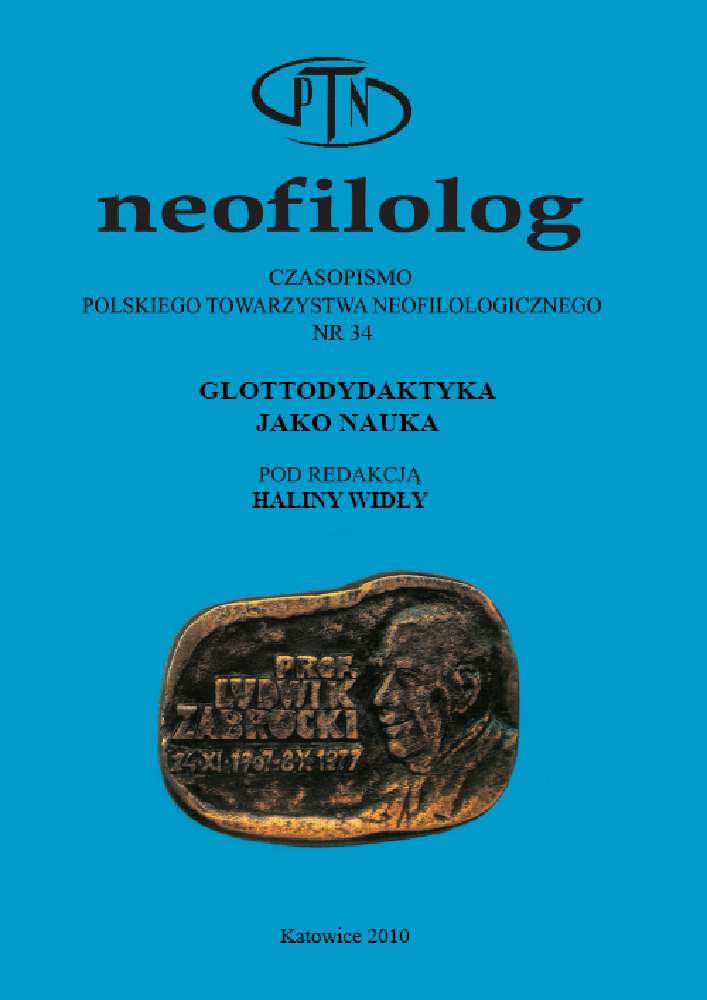Résumé
My thesis in this article is that developing glottodidactics as an academic discipline is an optimal program for the field of foreign language learning and teaching, especially considering its prospects of generating practically useful knowledge. I begin by making distinctions between ‘practice’, ‘theory’, and ‘science’ in the context of three stages in the maturation of our field. This is to show the qualitative differences between a) commonsense b) methodology, and c) an academic discipline with the prospect of satisfying social demands for knowledge which is useful in teaching, understood as its own application. Chances of this full-fledged discipline generating such knowledge, however, depend on its success in constituting itself as mirror image of an empirical discipline with an empirical system as its subject matter.
Références
Byram, W. (red.), 2004. Routledge Encyclopedia of Language Teaching and Learning. London: Routledge.
Crookes, G., 1992. Theory format and SLA theory. Studies in Second Language Acquisition 14, 425 – 449.
Crookes, G., 1997. SLA and language pedagogy. A socioeducational perspective. Studies in Second Language Acquisition 19, 93 – 116.
Dakowska, M., 1987. Funkcje lingwistyki w modelach i procesach glottodydaktycznych. Warszawa: PWN.
Dakowska, M., 1996. Models of Language Use and Language Learning in the Theory of Foreign Language Didactics. Franfurt am Main: Peter Lang.
Dakowska, M., 2000, Mechanizm czy organizm? Dwa bieguny modelowania akwizycji języków obcych. W: B. Kielar, J. Lewandowski, J. Lukszyn i T.P. Krzeszowski (red.), Problemy komunikacji międzykulturowej. Warszawa: Grafpunkt, 335 – 351.
Dakowska, M., 2003, Current Controversies in Foreign Language Didactics. Warszawa: Wydawnictwa Uniwersytetu Warszawskiego.
Dornyei, Z., 2009. The Psycholog y of Second Language Acquisition.Oxford: Oxford University Press.
Gregg, K., 1993. Taking explanation seriously; or, Let a couple of flowers bloom. Applied Linguistics 14, 3, 276 – 294.
Gregg, K., 2003. “SLA Theory: Construction and Assessment.” W: C.J. Doughty and M.H. Long (red.), The Handbook of Second Language Acquisition. Malden: Blackwell, 831 – 866.
Grucza, F., 1974. Lingwistyka a glottodydaktyka. Języki Obce w Szkole 3, 133 – 143.
Grucza, F., 1976. Lingwistyczne uwarunkowania glottodydaktyki. W: F. Grucza, (red.) Glottodydaktyka a lingwistyka. Warszawa: Wydawnictwa Uniwersytetu Warszawskiego, 7 – 25.
Grucza, F., 1983. Zagadnienia metalingwistyki. Lingwistyka – jej przedmiot, lingwistyka stosowana. Warszawa: PWN.
Johnson, M., 2004. A Philosophy of Second Language Acquisition. New Haven: Yale University Press.
Jordan, G., 2004. Theory Construction in Second Language Acquisition. Amsterdam: Benjamins.
Jupp, V., (red.), 2006. The Sage Dictionary of Social Research Methods. London: Sage.
Kaplan (red.), The Oxford Handbook of Applied Linguistics. Oxford: Oxford University Press.
Kumaravadivelu, B., 2003. Beyond Methods. Macrostrategies in Language Teaching. New Haven: Yale University Press.
Kumaravadivelu, B., 2006. Understanding Language Teaching. From Method to Post-Method. Mahwah: Lawrence Erlbaum.
Larsen-Freeman, D., 1997. Chaos/complexity science and second language acquisition. Applied Linguistics 18,2, 141 – 165.
Larsen-Freeman, D., L. Cameron, 2008. Complex Systems and Applied Linguistics. Oxford: Oxford University Press.
Long, M., 1993. Assessment strategies for SLA theories. Applied Linguistics 14, 225 – 249.
Long, M. 2004. Acquisition and teaching. W: M. Byram (red.), 4 – 5.
Long, M. H., 2004. “Second language acquisition theories.” W: Byram (red.), 527 – 534.
Long, M., 2007. Problems in SLA. Mahwah, N.J.: Lawrence Erlbaum Ass.
Mitchell, R., F. Myles, 1998. Second Language Learning Theories. London: Arnold
Richards, J.C., T.S. Rodgers, 2001. Approaches and Methods in Language Teaching. Cambridge: CUP.
Ritchie, W. C., i T. K. Bhatia (red.), Handbook of Second Language Acquisition. San Diego: Academic Press.
Swan, M., 2005. Legislation by hypothesis: The case of Task-Based Instruction. Applied Linguistics 26/3, 376 – 401.
Van Patten, B., J. Williams (red.), Theories in Second Language Acquisition. An Introduction. Mahwah, NJ: Lawrence Erlbaum.
Widowson, H., 2003. Defining Issues in English Language Teaching. Oxford: Oxford University Press.
Licence
© Maria Dakowska 2010

Ce travail est disponible sous licence Creative Commons Attribution - Pas de Modification 4.0 International.
Auteurs :
Les auteurs de textes acceptés pour publication dans la revue Neofilolog sont tenus de remplir, signer et renvoyer à l'adresse de la rédaction, un accord sur l'octroi d'une licence gratuite pour les œuvres, avec obligation d'accorder une sous-licence CC.
En vertu de cet accord, les auteurs des textes publiés dans la revue Neofilolog accordent à l'Université Adam Mickiewicz de Poznań une licence non exclusive et gratuite et permettent l'utilisation de la sous-licence Creative Commons Attribution-NoDerivatives 4.0 International (CC BY-ND 4.0).
Les auteurs se réservent le droit de disposer librement de l'œuvre.
Utilisateurs :
Les utilisateurs d'Internet intéressés ont le droit d'utiliser les œuvres publiées à partir de l'année 2017 sous réserve des conditions suivantes :
- reconnaissance de la qualité d'auteur - l'obligation de fournir des informations sur la qualité d'auteur, le titre, la source (liens vers l'œuvre originale, DOI) et la licence, ainsi que l'œuvre distribuée ;
- sans créer d'œuvres dérivées - l'œuvre doit être conservée dans sa forme originale, p. ex. les traductions ou les interprétations ne peuvent être distribuées sans le consentement de l'auteur.
Tous les textes publiés sont soumis au droit d'auteur.
Autres :
L'Université Adam Mickiewicz de Poznań se réserve le droit à la revue dans son ensemble (mise en page, forme graphique, titre, conception de la couverture, logo, etc.).
.
